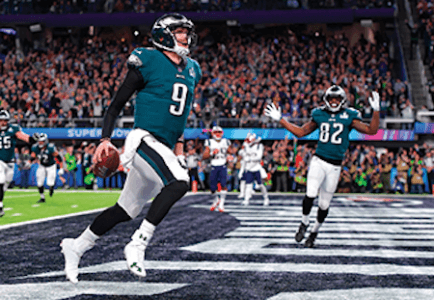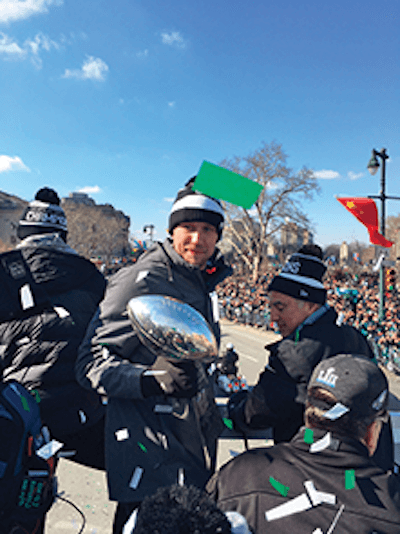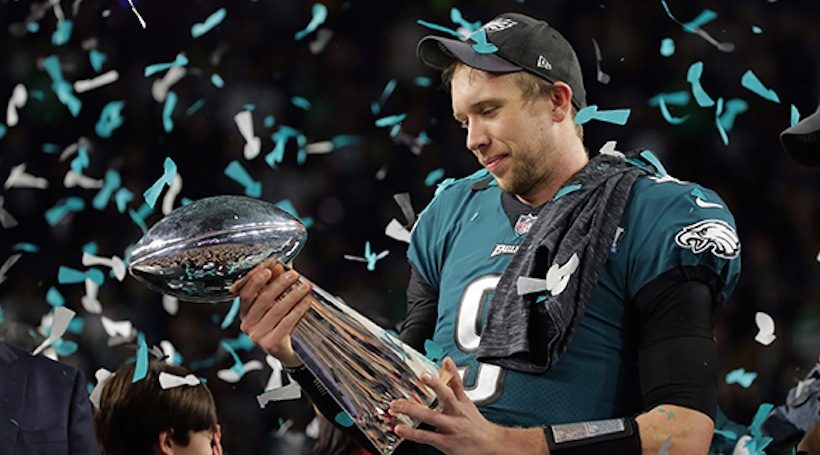After a rough run in football, the Eagles quarterback was searching for something to give his life meaning, something to make him happy. He found it. And thanks to Nick Foles, we all did.
For a moment, he found a sliver of silence. The previous few weeks had been crazy, “a whirlwind” Nick Foles called them. He was walking away from the day-after press conference, where he was presented the Pete Rozelle Trophy for Most Valuable Player in Super Bowl LII, toward a car that would take him to a private airplane and whisk him off to Disney World. He was about to serve as the honored guest at the resort’s annual parade.
“You always dream of this,” Foles says, “and then when it happens you just need to step back and kind of enjoy it. Let it happen. Try to remember every moment of it. So much has happened, though, I’m not sure I’m going to remember all of this.”
How could he? Foles, in his sixth NFL season, enjoyed the ultimate Cinderella story. He was just another backup quarterback until superstar Carson Wentz blew out his left knee in a December victory over the Los Angeles Rams. Suddenly Foles was thrust into the spotlight as the starting quarterback for the Philadelphia Eagles, the best team in the league to that point.
It was the same spotlight that nearly sent Foles into retirement only a couple of seasons earlier. The same spotlight from 2013, when he threw 27 touchdowns and only two interceptions for the Eagles, and then earned co-Most Valuable Player honors in the Pro Bowl after the season.
It is a spotlight that is cruel and unrelenting. One that exposes every wart and wrinkle.

Nick Foles scores at the Super Bowl, becoming the first quarterback to both throw a pass and catch a pass during the game.
“If you don’t have thick skin, you aren’t going to make it in this league,” Eagles head coach Doug Pederson said after the Eagles’ first Super Bowl win in franchise history. “Nick has gone through a lot in his life. He’s seen the rough side of this game. He’s one of those guys who doesn’t let it get to him. You see that in the way he carries himself. He’s an unflappable guy.”
Foles is also a human guy. His Super Bowl performance was historic: He completed 73 percent of his passes (second-best in NFL playoff history) during the 3-0 run. He tossed six touchdown passes and only one interception, averaged an outstanding 9.2 yards per pass attempt (anything over 7 yards per passing attempt is outstanding) and even caught a touchdown pass to become the first quarterback in NFL history to both throw and catch a pass in the same Super Bowl game (during which he passed for 373 yards, three touchdowns and one interception). But after the incredible game, he presented himself as a flawed man, earning him just as much love as he received in his playoff glory.
“I’m just being honest,” Foles says. “You can’t be afraid to fail, and when I said that, I meant it. Everyone thinks you have to present yourself as perfect, and that’s a false way to go through life. Nobody is perfect. I have my problems just like everybody else. I fail just like everybody else. If you don’t fail, how do you learn? We all
have weaknesses.”
“I’m out there on the field playing football, and everybody thinks I’m perfect. Well, I’m not. Nobody is perfect. I might be in the NFL and we just won the Super Bowl, but I go through the same struggles as everyone else does on a daily basis. It’s how we deal with those struggles that defines us.”
A week later, Foles appeared on “The Ellen Show” with Ellen DeGeneres, who said of Foles’ message: “I agree with you. I think failure, it’s cliché, but it builds character in a way that you don’t have unless you have failure. If people just succeed and succeed…you have to have failure.”
Foles’ football failures were well documented from that 27-and-2 season with the Eagles: He was traded a year later after an injury-plagued season playing in Chip Kelly’s offense, and after two years of lousy football in St. Louis with the Rams, Foles was ready to hang up his cleats and go into the ministry. Or join his father’s successful restaurant business – Larry Foles is the founder and owner of Eddie V’s Restaurants, located throughout Arizona and California.
He thought about finding something away from the spotlight where he could settle in with his wife, Tori, and their young daughter, Lily. All he wanted was joy. And football wasn’t providing it.

Foles holds the Vince Lombardi Trophy at the Eagles Parade of Champions.
Foles did his soul searching. He turned off his cell phone and went into the mountains. He consulted with Tori, who wrote him a letter urging him to follow his heart. And when Foles turned his phone on and searched through his text messages, he found one from former Eagles head coach Andy Reid, who drafted Foles in the third round of the 2012 draft, and who by then was the head coach in Kansas City.
“I just told him,” Reid says, “that he had too much good football left in him to give up the game. Nick is a good football player.”
So Foles played in Kansas City in 2016, out of the spotlight as a backup to Alex Smith, and the joy returned. After his contract expired, Foles joined the Eagles last spring as Wentz’s No. 2, and lived in relative anonymity until all heck broke loose when Wentz went down.
Just as the Eagles were preparing for the playoffs, the outlook from some on Foles was shaky, to the point where reporters twice asked Pederson in a press conference if he would consider pulling Foles if the quarterback struggled in the win-or-go-home games ahead.
“Nick is our quarterback, and he’s going to be fine,” Pederson said.
The rest is history, still being written in fairytale fashion with humility, grace and professionalism.
“I would describe all of this as a whirlwind,” Foles said on Bus 1 during the Eagles Parade of Champions four days after winning the Super Bowl.
“I mean, look at all these people. It means so much to them. It’s so inspiring to see how happy they all are. To be here and see all of this, it’s a dream come true. We all play this game because we love it, but also because we’re competitors and we want to win. I’ve never felt anything like this in my life, and I’m not sure how to describe it.”
“It’s just surreal, I guess. We won the Super Bowl and changed the lives of so many.”
 Eagles Insider Dave Spadaro has covered every Eagles game since 1987 and is seen and heard throughout the year on television, radio and Eagles coverage everywhere. You can hear his Eagles Live Podcast on iTunes.
Eagles Insider Dave Spadaro has covered every Eagles game since 1987 and is seen and heard throughout the year on television, radio and Eagles coverage everywhere. You can hear his Eagles Live Podcast on iTunes.














